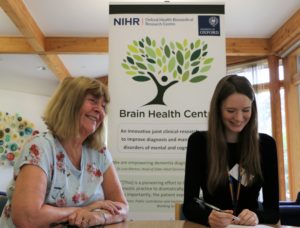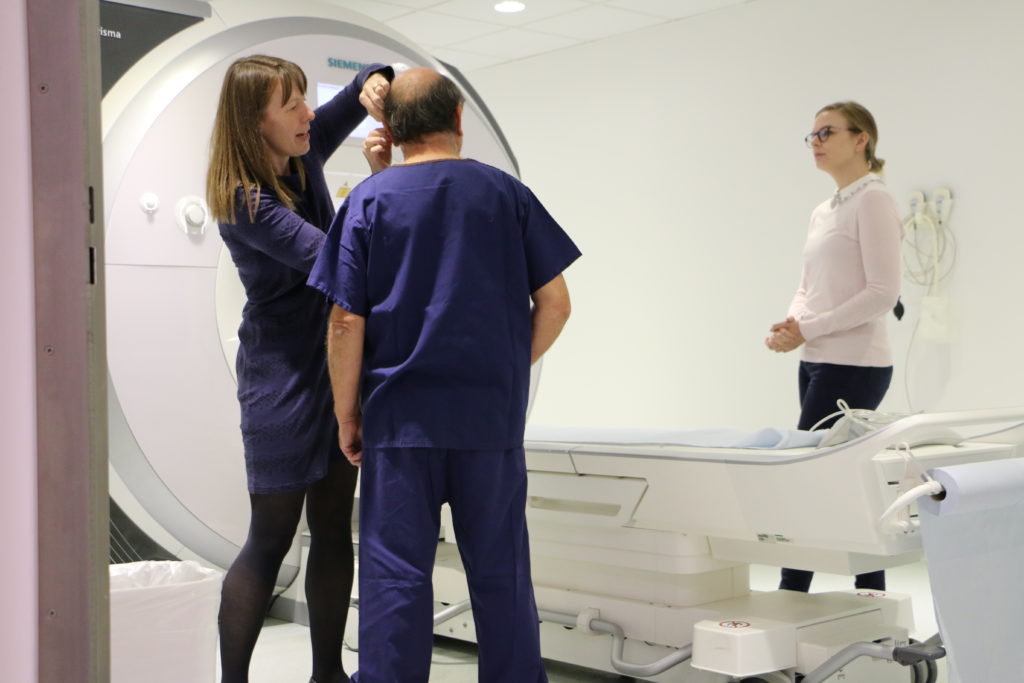An overview for patients and their relatives visiting the Oxford Brain Health Clinic for a memory assessment
This section gives you useful information about what to expect prior to, and during, your appointment at the Brain Health Clinic, as well as directions and contact information. As everyone who attends the brain health assessment here is given the opportunity to take part in research, this section also provides more detail about that process.
Why am I attending the Oxford Brain Health Clinic?
You will be invited to an appointment at the Brain Health Clinic if you have been referred by a memory clinic and you may benefit from having an MRI scan. There are many causes of memory problems so we will complete a range of assessments to try to understand the reasons for the symptoms you may be experiencing. The results of these assessments are shared with your doctor to help decide any diagnosis or treatment that may be given at the memory clinic.

What will happen at the visit to the Oxford Brain Health Clinic?
Before you arrive

You will be contacted by one of our radiographers who will talk to you about the MRI scan and check your suitability. We will then contact you to arrange an appointment.
Before your appointment, you will receive a letter from us with information about your visit, a leaflet about the MRI scan and about research at the Brain Health Clinic as well as a set of questionnaires for you to complete and bring with you to the appointment. You will be asked to bring a relative or person who knows you well.
Arriving for your appointment
Parking is available directly outside the yellow OHBA (Oxford Centre for Human Brain Activity) building at the Warneford Hospital. Please report to reception when you arrive. Directions to OHBA.
What will happen at the appointment?
Your appointment will last up to 2.5 hours. On arrival, you will be welcomed by a member of staff who will explain what will happen during the appointment and answer any questions you may have.
You will have your MRI scan, which will last between 15 and 35 minutes. We will provide you with some comfortable ‘pyjamas’ to change into for the MRI scan. The person that accompanies you to your appointment may help you change, if required.
Watch a video about your MRI scan at the Brain Health Centre.

We will also ask you to complete a short set of assessments to help the doctor understand your memory and thinking skills. It’s not like a school test or exam and it doesn’t involve anything physical like measurement or injections.
Watch a video about the about the memory tests.
You and the person that accompanies you will also have the choice of whether to take part in additional research at the Brain Health Clinic. If you decide not to take part, your medical care will not be affected. If you decide to take part, you can change your mind at any time.
What will happen next?
The results from the clinical assessments will be summarised in a report and sent to the doctors at the memory service. The MRI scan will be reviewed by a specialist doctor and a report will be sent to the memory clinic doctors too. When you go to your memory clinic appointment, the doctors will then discuss the results of the tests with you. You may have additional assessments, such as memory tests, at the memory clinic appointment.
About the research
How we will use the research data
Research at the Brain Health Clinic will produce data that help researchers make important progress in the understanding of memory problems and types of dementia. The results of the research will be published in scientific journals and presented at national and international conferences. However it will not be possible to identify individuals from those articles and presentations.
What is involved?
You can choose to take part in research at the Brain Health Clinic in the following ways:
Storing your test results
You can allow us to store and use your medical test results for use in scientific research. We will also store information related to your memory problem from your medical records. This information will be stored without your name or other information that could identify you.
Extra research tests
You can choose to do additional research tests on the same day as your medical tests. The results will help researchers improve how patients with memory problems are assessed and give doctors better assessments in future. You decide how many extra tests you would like to do at your visit to the Brain Health Clinic. The options are:
- MRI scanning: You can remain in the MRI scanner for an extra 15 minutes to allow us to take more pictures of your brain
- Saliva sample: In less than 5 minutes, you can provide a sample that can show the presence of genes that increase the risk of having cognitive problems.
- Questionnaires: The person who accompanies you, can answer some questions related to brain health, taking about 10 minutes.
We will store the results of research tests, with your medical test results, in the research database.
Hearing about future studies
You can also choose to hear about opportunities to take part in future research studies. Of course, there will be no obligation to take part. Alternatively you may prefer to nominate a friend or relative to be contacted about future research on your behalf. Your nominated friend or relative must agree to this and sign a separate consent form.
What will happen to my information?
Your test results will be stored in the Brain Health Clinic Research database, which is a collection of information stored securely on a computer. These results will not include your name or any other information that could identify you. Researchers can apply to access this information for scientific purposes.
We will also separately, and securely, store your name, contact details and NHS number so we can access your medical records and contact you about future studies, if you agree to this.
Information for patient companions
The role of the companion
The companion will be expected to have knowledge of the patient’s medical history to help us confirm suitability for the MRI scan on the day.
As part of the clinical assessment, the companion will be asked to complete an Informant Interview with a member of Brain Health Clinic staff, including questions about changes in the patient’s thinking skills, behaviour and general function.
Participation in research
The companion is also offered the opportunity to take part in research. They can choose to complete research questionnaires about any cognitive and behavioural changes observed in the patient, and about their own experience of being close to someone experiencing memory problems. They can also choose to consent to be contacted about research in future. Where the patient lacks capacity to consent to research, the companion may also be asked to act as a Consultee to agree to take part in research on the patient’s behalf.
Location and contacts
Find directions to the Oxford Centre for Human Brain Activity here.
Contact us
By post:
Brain Health Clinic Administrator,
Oxford Centre for Human Brain Activity,
Warneford Hospital, Oxford, OX3 7BJ
By phone:
01865 618184 (Monday – Thursday 8:30-16:30)
An answer phone is available outside these hours.
Get involved with our Advisory Group
Patient and public involvement and engagement (PPIE) in the Brain Health Clinic ensures that the services are designed around those who use them.
The Brain Health Clinic Advisory Group consists of patients, carers and interested members of the public who advise the Brain Health Clinic and ensure that the service is centred around the needs of patients. The Advisory Group has written its own PPIE objectives. We welcome new members to the advisory group and strive to make the group as diverse and representative as possible.
This video discusses the benefits and impact of collaboration with PPIE contributors to research at Oxford Brain Health Clinic: Jasmine Blane ARUK
Find out more about patient and public involvement on our PPI pages or contact Jasmine Blane at jasmine.blane@psych.ox.ac.uk for more information.


